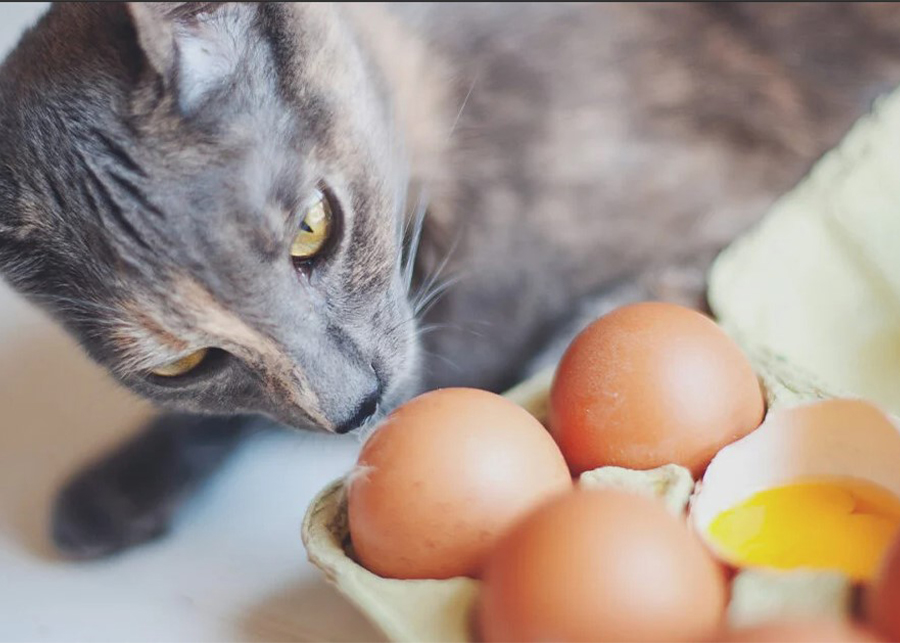If the thought of having a pet cat has crossed your mind, you’ve probably wondered if it was safe to give them eggs. Cats are often portrayed in cartoons as wanting to pounce on every egg they see. Are eggs really that bad for cats? The answer is no, cats can eat eggs. In fact, there are numerous nutritional benefits for your beloved feline friend to enjoy. But let’s get into the specifics and answer some other questions such as: Are raw eggs okay for cats to eat? Do cooked eggs present risks? What about hard boiled eggs? If you have any more questions regarding feeding your cat eggs don’t worry! We’ll cover everything here!
Do you have a cat and are wondering if it’s safe to give them eggs? Wonder no more! In this blog post, we’ll explore the answer to that question as well as provide some other tips on feeding your feline friend. Keep reading for more information.
Are Eggs Good for Cats?
There is some debate on this topic, as eggs are a high-protein food and too much protein can be harmful to cats. However, many people believe that eggs are a healthy addition to a cat’s diet and can provide important nutrients. Consult with your veterinarian before feeding your cat eggs to make sure they are a good fit for her diet.
How Many Eggs Can Eat a Cat Eat?
There’s no hard and fast rule for how many eggs a cat can eat, as it depends on the individual cat’s size and metabolism. However, generally speaking, a healthy cat can consume one to two eggs per day without any problems. If your cat is particularly active or has a high metabolism, she may be able to handle more eggs than that. Just be sure to keep an eye on her overall health and energy levels to make sure she’s not overdoing it. And as always, consult with your veterinarian if you have any concerns about your cat’s diet.
The Benefits of Eggs for Cats
There are many benefits of eggs for cats. Eggs are an excellent source of protein and contain all the essential amino acids that cats need. They are also low in calories and fat, and contain B vitamins, choline, and selenium. Eggs can help improve a cat’s coat and skin health, and boost their immune system.
If you’re thinking about adding eggs to your cat’s diet, discuss it with your veterinarian first to make sure they are devoid of any diseases or conditions that may make them unsafe for consumption. Raw eggs may be best avoided as there is a risk of Salmonella infection.

Can pregnant cats eat eggs?
Expecting mother cats can consume moderate amounts of eggs while they are pregnant. The yolk specifically contains nutrients like choline that are essential for the development of their offspring’s neural tube. Just make sure to cook the eggs properly to avoid any salmonella poisoning. Too much egg though can lead to issues with the expectant mom’s digestive system, so it’s best to err on the side of caution and only give her a few at a time.
Can Cats Eat Eggs? Result
As you can see, there’s no hard and fast rule for how many eggs your cat can eat. It depends on the individual cat, though one or two eggs per day is a good starting point. Don’t forget to be mindful of your cat’s energy levels and overall health when adding eggs to her diet.
What Human Foods Can Cats Eat?
While you’re experimenting with new foods, remember that your cat can tolerate new food slowly. While cats can tolerate human food in small amounts, some foods are more appealing to them than others. Regardless of the food you’re trying to introduce, it’s important to keep an eye on digestion and consult your veterinarian if you notice any changes. While some cats are able to tolerate new foods well, others need to be avoided completely.
While humans have a high requirement of carbohydrates, cats do not. However, unrefined whole grains are a good addition to a cat’s diet, providing them with essential vitamins and minerals, along with fiber to aid in digestion. However, you should limit grains to five to ten percent of your cat’s diet. Quinoa, a grain-like seed, is another healthy option. Not only is it low in fat and high in antioxidants, but it also contains a high amount of iron, which is essential for your cat’s overall health.
Although some common human foods can be consumed by cats, they’re not good for them. Some can cause serious health issues or even death. Avoid sugary treats and sweet foods like chocolate and raw dough. Likewise, alcohol can be harmful for small pets, and can cause seizures or kidney failure. These foods should be strictly limited to only those that your cat has an interest in. In addition, some foods that humans eat are dangerous for cats.
F.A.Q
Can I give my cat scrambled eggs?
Cats can eat eggs cooked every way, including scrambled eggs. Eggs, especially the yolk, contain vitamins that can benefit your cat’s overall health. Extreme care should be taken, however, not to add too much fat to your cat’s diet. You should consult with your veterinarian before giving scrambled eggs to your cat.
How much egg can a cat eat?
There is no precise answer to how much egg your cat should eat because the amount depends on her age, her size, and her level of physical activity as well as many other factors. Most experts agree that healthy adult cats can handle a small amount of egg without any negative effects, but ingesting large amounts of egg over time can cause pancreatic disorders and nutritional deficiencies.
